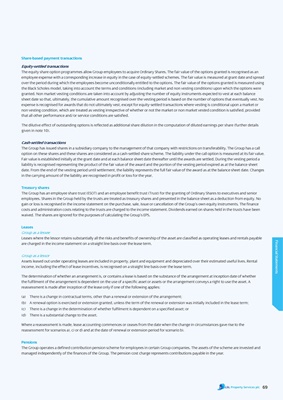
Share-based payment transactions
Equity-settled transactions
The equity share option programmes allow Group employees to acquire Ordinary Shares. The fair value of the options granted is recognised as an
employee expense with a corresponding increase in equity in the case of equity-settled schemes. The fair value is measured at grant date and spread
over the period during which the employees become unconditionally entitled to the options. The fair value of the options granted is measured using
the Black Scholes model, taking into account the terms and conditions (including market and non vesting conditions) upon which the options were
granted. Non market vesting conditions are taken into account by adjusting the number of equity instruments expected to vest at each balance
sheet date so that, ultimately, the cumulative amount recognised over the vesting period is based on the number of options that eventually vest. No
expense is recognised for awards that do not ultimately vest, except for equity-settled transactions where vesting is conditional upon a market or
non vesting condition, which are treated as vesting irrespective of whether or not the market or non market vested condition is satisfied, provided
that all other performance and/or service conditions are satisfied.
The dilutive effect of outstanding options is reflected as additional share dilution in the computation of diluted earnings per share (further details
given in note 10).
cash-settled transactions
The Group has issued shares in a subsidiary company to the management of that company with restrictions on transferability. The Group has a call
option on these shares and these shares are considered as a cash-settled share scheme. The liability under the call option is measured at its fair value.
Fair value is established initially at the grant date and at each balance sheet date thereafter until the awards are settled. During the vesting period a
liability is recognised representing the product of the fair value of the award and the portion of the vesting period expired as at the balance sheet
date. From the end of the vesting period until settlement, the liability represents the full fair value of the award as at the balance sheet date. Changes
in the carrying amount of the liability are recognised in profit or loss for the year.
treasury shares
The Group has an employee share trust (ESOT) and an employee benefit trust (Trust) for the granting of Ordinary Shares to executives and senior
employees. Shares in the Group held by the trusts are treated as treasury shares and presented in the balance sheet as a deduction from equity. No
gain or loss is recognised in the income statement on the purchase, sale, issue or cancellation of the Group’s own equity instruments. The finance
costs and administration costs relating to the trusts are charged to the income statement. Dividends earned on shares held in the trusts have been
waived. The shares are ignored for the purposes of calculating the Group’s EPS.
Leases
Group as a lessee
Leases where the lessor retains substantially all the risks and benefits of ownership of the asset are classified as operating leases and rentals payable
Financial Statements
are charged in the income statement on a straight line basis over the lease term.
Group as a lessor
Assets leased out under operating leases are included in property, plant and equipment and depreciated over their estimated useful lives. Rental
income, including the effect of lease incentives, is recognised on a straight line basis over the lease term.
The determination of whether an arrangement is, or contains a lease is based on the substance of the arrangement at inception date of whether
the fulfilment of the arrangement is dependent on the use of a specific asset or assets or the arrangement conveys a right to use the asset. A
reassessment is made after inception of the lease only if one of the following applies:
(a) There is a change in contractual terms, other than a renewal or extension of the arrangement;
(b) A renewal option is exercised or extension granted, unless the term of the renewal or extension was initially included in the lease term;
(c) There is a change in the determination of whether fulfilment is dependent on a specified asset; or
(d) There is a substantial change to the asset.
Where a reassessment is made, lease accounting commences or ceases from the date when the change in circumstances gave rise to the
reassessment for scenarios a), c) or d) and at the date of renewal or extension period for scenario b).
Pensions
The Group operates a defined contribution pension scheme for employees in certain Group companies. The assets of the scheme are invested and
managed independently of the finances of the Group. The pension cost charge represents contributions payable in the year.
69